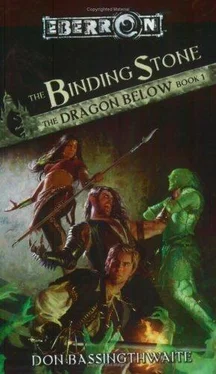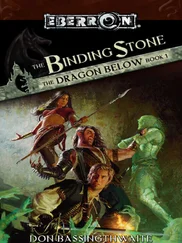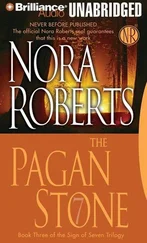Daraskint: Eberron, the mystical Dragon Between. "Eberron" is also commonly used.
Darasvern: Siberys, the mystical Dragon Above. "Siberys" is also commonly used.
Darasvhir: Khyber, the mystical Dragon Below. "Khyber" is also commonly used. do: to do (takes conjugation 1). doke: will (conjugation 1; future tense is regular and is formed the same as the present tense; past tense "would" never varies and is always "tdoke"). dru: bone duskav: stranger e: and each: zhir eche: that. Plural: eches egri: there eva: three (number) firgri'i: everywhere gentis: depths get: deep (adjective) gri: here gri'i: where ha-: a marker of respect. Adding the prefix ha-to something implies respect and sets it above other things of its kinds. harano: honor. Literally translated it means "a respected name." hushen: to return from a place (takes conjugation 2) itri: must kint: arcane magic, but also any magic that is not obivously healing or defensive. Kint is opposed to brosh and is often refered to as "world-magic." kintama/kintano: a wizard or hermit. Kintamas and kintanos are usually considered as dangerous, bad-tempered individuals who live as hermits. klavit: to bring back (takes conjugation 1) kri: to be (takes conjugation 2; third person singular is irregular-"krii"). A relatively recent term for "to be." kriazam: a changeling. Literally translated, it means "false person." kto: than mado: to need (takes conjugation 1) make: shall (conjugation 1; future tense is regular and is formed the same as the present tense; past tense "should" never varies and is always "tmake") mas: tree mot: four (number) pa-: more or very pinde: to know (takes conjugation 2) pret: can (conjugation 1; past tense "could" never varies and is always "tpret") rana: a shaman or priest rano: a name reis: tough. "Reis" is a condition rather than an adjective and a person is said to "have reis" rather than "be reis." rond: fierce. "Rond" is a condition rather than an adjective and a person is said to "have rond" rather than "be rond." shei: to hunt (takes conjugation 1) sheid: a hunter shial: to pray (takes conjugation 1) sikint: a term used among the Bonetree to describe the psionics used by kalashtar. "Sikint" combines the "psi-" prefix with the Azhani word for magic.
Su: For/In the name of sut: to follow or accompany (takes conjugation 1) ta: to have (takes conjugation 1) teith: blood teithkint: a rare form of blood magic practiced among certain clans of the Az. theth: 1) silence. 2) silent (adjective). va: two (number) varda: a fight, specifically a fight between individuals. It's similar to "duel" in meaning but without formality. "Varda" can take place in the middle of mass combat. vit: to bring (takes conjugation 1) zhan: to speak (takes conjugation 1) zhani: language
Azhani Expressions
Che Harana: "Revered," the title given by the Bonetree clan to Dah'mir. Literally translated it means "the honored priest."
Drumasaz: The Bonetree clan. Often referred to simply as "Drumas."
Khyberit gentis: "Khyber's depths"-an expression of frustration.
Kriid patheth. A sheia bibisas.: "Be very quiet. I'm hunting rabbits."
Rond betch: "Fierce darkness"-an expression of amazement or anger.
Rond e reis: A worthy adversary or a strong warrior is said to be characterized by "rond e reis"-they are fierce and tough.
Su Drumas! Su Darasvhir!: "For the Bonetree! For the Dragon Below!" — the pledge and battle cry of the Bonetree clan.
Varda su teith e harano: "A fight for blood and honor."
Azhani Pronouns,other parts of speech,Azhani conjugations
Conjugation 1 covers virtually all Azhani verbs. Conjugation 2 verbs tend to be newer and more esoteric in nature. The unusual nature of their conjugation, together with the way they break the otherwise constant rule that identical vowels sounds are broken with a glotal stop (i.e. "mado'o" but "pindeer") suggests a these verbs were adapted from some other source.
.












